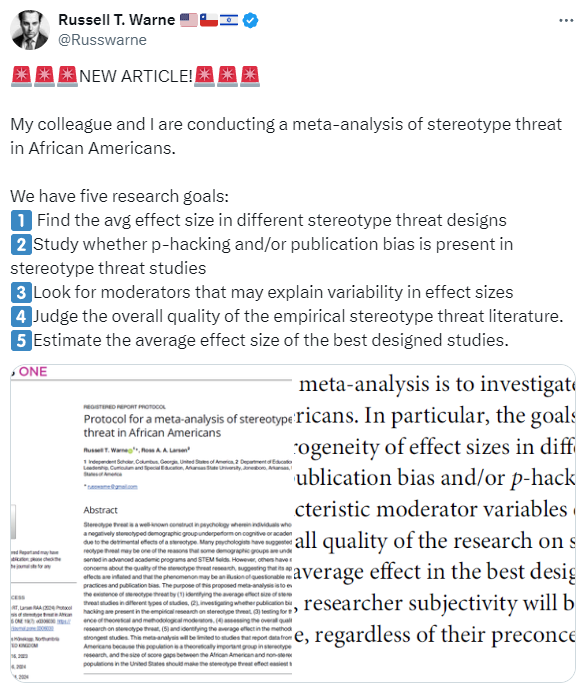
Russell Warne has preregistered a protocol for a meta-analysis of stereotype threat effects among African Americans with coauthor Ross Larsen. It's published in PLOS ONE and can be found here: https://journals.plos.org/plosone/article?id=10.1371/journal.pone.0306030
Russell and Ross have five research goals, listed here:

This poll asks: What will the meta-analytic effect size without adjustments for moderators or publication bias be? The market will resolve to the range the effect size ultimately falls in whenever a preprint comes out or the paper is published.
Tweet thread link: https://x.com/Russwarne/status/1816173700166959390
For the sake of clarity: a negative effect size indicates bias against African Americans. The effect size is the SMD, whether Cohen's d, Hedge's g, or whatever else Warne and Larsen may choose to use. It will be the effect size derived from their preregistered first and second designs, i.e., the designs dealing with the within-person effects of stereotype threat and the between-person treatment effect of stereotype threat.
It looks like effect size means cohens' d here. What does the sign mean? Stereotype threat is claimed to (but doesn't lol) decrease performance on cognitive tasks, so I might expect a result finding stereotype threat to resolve this negative, but cohen's d is often reported as positive
Also, this question is about "What will the meta-analytic effect size without adjustments for moderators or publication bias be", and Warne expects that to be nonzero, so you should put that in the title somehow.
I've only heard stereotype threat discussed as an effect that decreases the relative test performance of black Americans relative to whites. So I think it's clear that positive effect sizes mean that stereotype threat exposure decreases the relative test scores of black Americans.
But I agree that this should be put into the title or description.